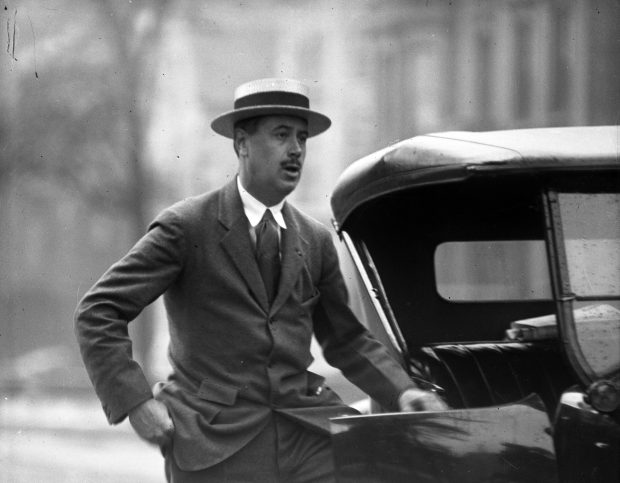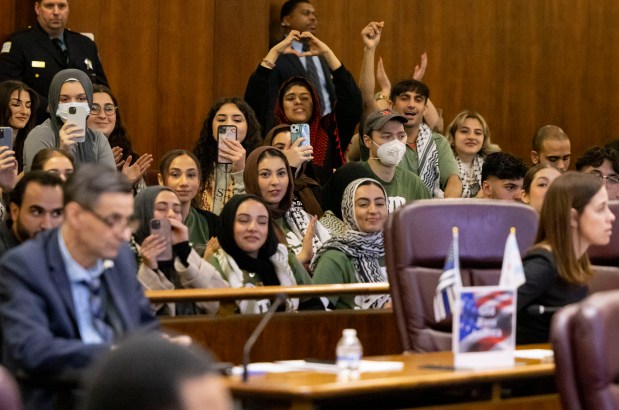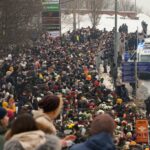In the 1920s, Chicago’s last Republican mayor, William Hale “Big Bill” Thompson, embodied the tradition of isolationism in the nation’s heartland when he decried Great Britain and famously threatened to punch King George V “in the snoot” if they ever met.
In the leadup to both world wars in the last century, many in Chicago and the Midwest were the strongest advocates for “America First” and keeping the United States out of foreign wars and entanglements. Yet, once the wars started, this city of immigrants sent its sons to fight.
There have always been countervailing forces pushing Chicago to be a global city engaged with the world, and the recent controversial City Council resolution calling for a cease-fire in Gaza is just the latest example of how Chicagoans can’t sit idly on the globe’s sidelines.
Mayor Brandon Johnson cast the tie-breaking vote on Jan. 31 when the nonbinding resolution was approved after a long, divisive battle, making Chicago the largest city in the country to issue the call. The fight exposed deep disputes in the Democratic Party over the Israel-Hamas war.
After Hamas terrorists on Oct. 7 slaughtered 1,200 Israelis, raped and tortured victims, and took more than 200 hostages, the world rightly condemned the group’s crimes. The Israeli counterattack against Hamas in Gaza has now killed an estimated 30,000 Palestinians, 70% of them women and children, displaced 1.7 million Palestinians and touched off cries of “Genocide Joe” by Arab Americans who criticize President Joe Biden’s steady support for Israel.
Given those staggering casualty figures, Johnson won praise for his moral leadership from many progressives and Arab and Jewish Chicagoans as well. He and his supporters also drew sharp rebukes, including from Ald. Debra Silverstein, 50th, the only Jewish member of the City Council, and the Israeli Consulate, that the resolution undermines Biden’s foreign policy.
“To some degree, I think Chicago has always been a global city,” said Alia Bilal, chief executive director of the Inner-City Muslim Action Network, one of the groups commending Johnson. “From the founding of the city by a Haitian immigrant to the hosting of the World’s Columbian Exposition, this has always been a city that the globe looks to, and we look out to the rest of the world. All politics is local, but I think all politics is also global.”
In modern times, the Chicago City Council has weighed in on other global issues, such as through a 1984 resolution that condemned apartheid in South Africa and a 2003 resolution that denounced the drive toward a U.S. war in Iraq. Those local actions and others sent a strong message in national debates about where middle America stands on those issues.
“Yes, Chicago was known for its isolationism in the 1930s, and Col. Robert McCormick, publisher at the Tribune, was a part of that for sure,” said Richard Longworth, an author and distinguished fellow at the Chicago Council on Global Affairs.
“And the Chicago Council was formed, in fact, in opposition to that argument” that America should stay out of global entanglements, he said.

The council was founded in 1922 as an impartial organization to help educate Midwesterners on the importance of foreign affairs. “Things have changed a ton” with expanding immigration and global trade, Longworth said. “You would be hard-pressed to find real isolationism in Chicago.”
A century later, however, the country’s polarized politics are bucking that trend, recent council surveys have found. In one recent council poll, for the first time in nearly 50 years of surveys, a majority of Republicans (53%) said the United States should stay out of world affairs — while 57% of Americans overall still want the nation to take an active role in the world.
“But that’s not Chicago,” Longworth told me, attributing the change to economic hardship caused by globalization downstate and across the country, an anti-immigrant mood in conservative politics and America First policies promoted by former President Donald Trump.
No doubt, several factors are contributing to Chicago’s deepening engagement with the world, including the rise of the internet and social media platforms that make much of local politics now global politics.
“In an era of social media, what I see is an age of empathy,” said Robert Pape, a professor of political science at the University of Chicago. He pointed to the wars in Ukraine and Gaza as recent cases in which graphic images and videos come across phone screens with immediacy, depicting the torture and massacre of Ukrainians in Bucha or the bodies of Palestinian children amid the rubble in Khan Yunis.
“In a modern age of empathy and social media, it is so common for people to identify with the plight of people overseas,” said Pape, who also is director of the U. of C.’s Chicago Project on Security and Threats. “It’s hard for political leaders to avoid these issues, and I think what you are seeing basically is support for positions that have a lot to do with empathizing with other people.”

There wasn’t much empathy from Johnson’s critics, many of whom wanted him to work harder on Chicago’s problems rather than weigh in on what’s happening in the Middle East. In a boisterous session in October, the City Council also passed a resolution declaring support for Israel following the Oct. 7 attack.
The mayor’s actions are of a piece with a history of activism, community organizing and Chicago’s engagement with the world. In fact, groups that have traditionally supported justice, equality and peace for Palestinians have seen a jump in their support, related in part to long-standing Black solidarity with the Palestinian people. Both groups see common cause in freedom struggles dating to Malcolm X, James Baldwin, Toni Morrison, the Rev. Jesse Jackson and others.
“Our membership in Chicago and around the country has grown fivefold since right after Oct. 7,” said Lesley Williams, who organizes around anti-racism, Islamophobia and Palestinian rights for Jewish Voice for Peace in Chicago. JVP is one of 160 organizations that supported the cease-fire resolution.
“I think Chicago, like other cities in the U.S., has always been more global,” said Williams, who is on the national board of Jewish Voice for Peace Action. “I think what has changed is that overall, America is simply becoming more aware of human rights abuses and U.S. involvement in them.”
With the national political conventions coming this summer, the world will likely see protests for international causes only getting bigger, louder and more influential in this global city.
Storer H. Rowley, a former national editor and foreign correspondent for the Chicago Tribune, teaches journalism and communication at Northwestern University.
Storer H. Rowley , 2024-03-03 11:01:56
Source link


